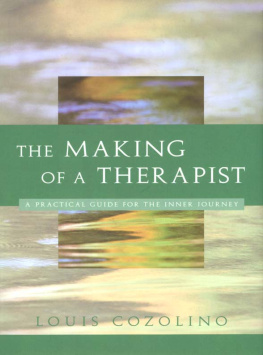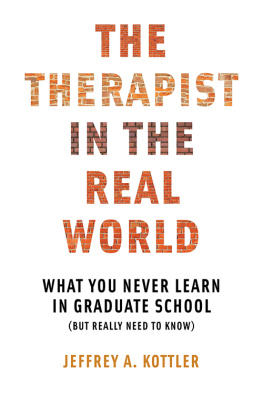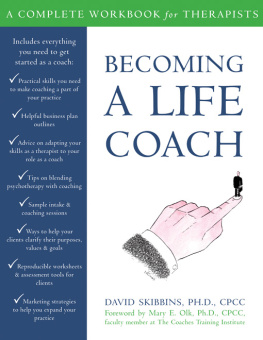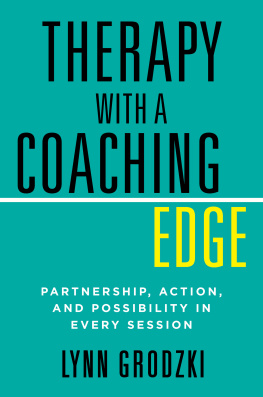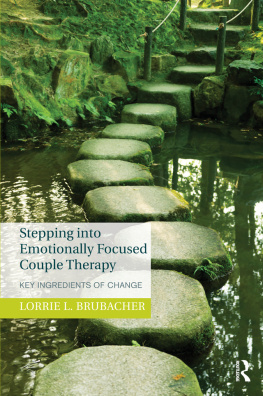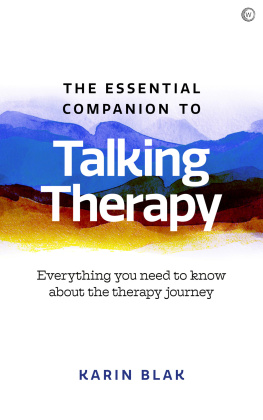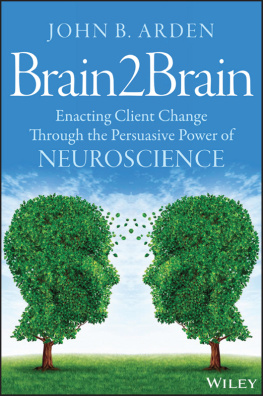ALSO BY LOUIS COZOLINO
The Neuroscience of Psychotherapy:
Building and Rebuilding the Human Brain
A Norton Professional Book
Only as a warrior can one survive the path of knowledge.
DON JUAN
SO YOUVE STARTED your training as a therapist and all you can think is, I feel like a fraud. Or to put it more kindly, you may ask, How can I do this when I am so confused and have so many problems of my own? Countless times over the years I have been pulled aside by students and told some version of the following: Here I am trying to help my clients, meanwhile I feel like Im going nuts. How can I help someone else when Im struggling with my own issues? I used to think that I was sane, but Im not sure anymore. I should have listened to my father and been a lawyer. At least they dont have to be sane. Sound familiar? Because Ive heard statements like this from so many students (and experienced them myself), Ive come to see that these feelings may be a common hurdle on the path to becoming a therapist. We all need to become aware of our pain and uncertainties and then grow through them. What makes a good therapist is personal courage; the courage to face ones fears, limitations, and confusion.
Why are therapists so vulnerable to doubts about our competence and sanity? We are, by nature, prone to self-examination, and what therapist hasnt seen him- or herself reflected in the cases he or she studies? We have a sense of our own fears, insecurities, and craziness while we accord others their polished social presentation. Then there is the fact that we therapists tend to come from families in which emotional conflicts interfered with our getting the help and guidance we needed while growing up. Most therapists grew up struggling to be loved and accepted by others. Because of these early experiences, many of us find it difficult to believe others can be of help to us. We carry this struggle into our adult lives and, inevitably, into our relationships with our clients.
A mistake I made during my training was trying to impress my supervisors with how good a therapist I was. I would present my successes, downplay my failures, and hide my confusion. This defense, similar to the one I employed during childhood, only enhanced my sense of being a fraud. I was putting on a show and gaining approval, all the while undermining my confidence and training. A breakthrough in my training and personal growth came when I found the courage to appear weak, uncertain, and share my mistakes openly.
At what point are we healthy enough to help other people? It is normal for human beings to be confused, and all of us have problems and issues. Therapists are never done with growth, they are simply people who should be dedicated to learning as much about themselves and others as they possibly can. The best therapists are fully human and engage in the struggles of life. Our own failures help us to remain open to the struggles of others; our personal victories give us the optimism and courage to inspire those struggling with their lives.
Do we need to have our lives in order before we can help someone? If that were the case, few clients would ever get helped! Life is messy, and each new stage brings new challenges. Buddhists describe the self as an endlessly peeling onion, every discovery revealing new layers to explore and uncover. This has certainly been my experience as I am repeatedly awakened to new discoveries of my own ignorance. A good therapist is not perfect but simply a person dedicated to ongoing self-discovery and lifelong learning. We continue to live and grow with and through our limitations.
The key to ongoing growth, to continue to peel the onion, is transparency and openness to feedback. In other words, sharing what is going on inside and struggling to understand your therapists, supervisors, and trusted advisors. You cant do this alone.
You never know who will end up being your teacher. Years ago, while wandering through a flea market, I encountered an elderly gentleman named Emmett. He caught my attention because of his wild white hair and the large button on his chest with the words I Dont Know. My fascination with interesting characters led me to ask about his button and, as is often the case in such encounters, a long and detailed story ensued.
Apparently, his inquisitive young grandson had recently begun asking a new question every 20 seconds. Despite Emmetts advanced age and intelligence, he was confronted with the reality of how few of his grandsons questions he was able to answer. He really didnt know where the sky came from, why people are mean to each other, or why God took Grandma to heaven and left him alone. These were questions he had long ago learned not to ask. Emmett was honest about his ignorance and repeatedly told his grandson that he didnt know.
The childs frustration grew to the point where he finally shouted, I dont know, I dont know! Grandpa, what do you know? After a long career as an engineer and manager, answering hundreds of questions every day, Emmett was stumped by a 4-year-old. Emmett was a remarkable man. Unembarrassed by his ignorance, he made no attempt to cover it up. Instead of providing easy answers, he took responsibility for helping his grandson to discover his own answers. This attitude allowed him to explore ideas and feelings, look things up when that was possible, and openly discuss complicated and emotionally difficult questions. Emmett said that he felt he learned as much as his grandson during their discussions and wore the button to remind him that ignorance is the door to new learning.
Awakening to ignorance has been a persistent theme in wisdom philosophy everywhere in the world throughout time. When the oracle at Delphi told Socrates that he was the wisest of men, Socrates assumed that the oracle was mistaken; he was certain of his own ignorance. It later dawned on him, while watching the folly of those convinced of their knowledge, that the oracle recognized his awareness of his ignorance as wisdom. This same insight is a core teaching of the many schools of Buddhism that focus on seeing past the illusions of the mind and the material world. If you recognize and accept your ignorance, you will not only be a better therapist, you will also be in the good company of Buddha, Socrates, and my new friend Emmett.
Give yourself permission to not know. Like Emmett, nurture relationships with your clients that include your limitations and allow for honest exploration. Be supportive of yourself, be reasonable in demands on your progress, and reinforce your strengths and what you are able to accomplish. Instead of comparing yourself to teachers or master clinicians you see on tape, use an internal yardstick to judge your progress: Compare where you are now to where you were 6 months ago. In psychotherapy, there is infinite room for improvement and, in turn, infinite room for self-criticism. Your ignorance is not a bottomless pit, it is a container to be filled with knowledge and experience.
Jeff was a new therapist working with an irritable client we came to call the angry guy. Each session, the angry guy demanded that Jeff provide him with simple solutions to complex problems. He would come in with a list of questions such as How do I find a girlfriend? and What career should I pursue? only to be disappointed when the session ended without an answer. He would stand, look Jeff in the eye, and say, What kind of therapist are you? then shake his head with profound disapproval and walk out of the office.
This took its toll on Jeff and he began to feel bad about his therapeutic abilities. He would try to offer some practical advice to the angry guy, but was always told that he should return to the drawing board. Jeff felt frustrated and increasingly angry with the angry guy. It seemed Jeff could do nothing right. I told him, Its not about you knowing what your client should do, its about you providing a relationship in which he can discover himself. I suggested that instead of coming up with answers, he try to share how his client made him feel.

